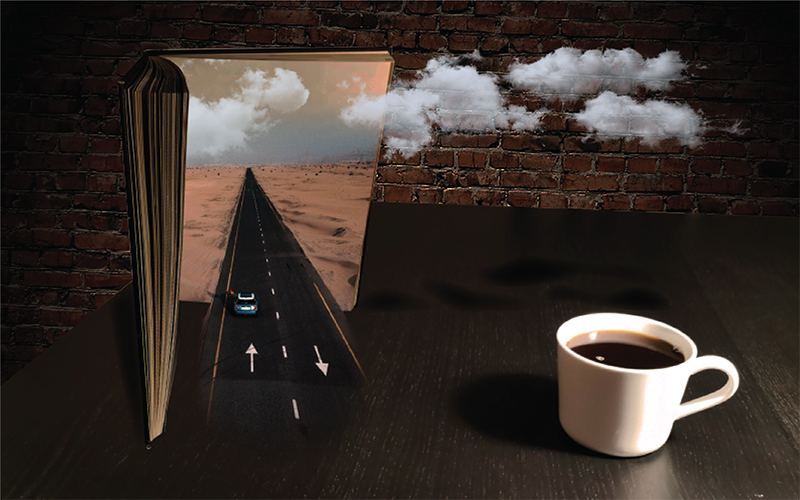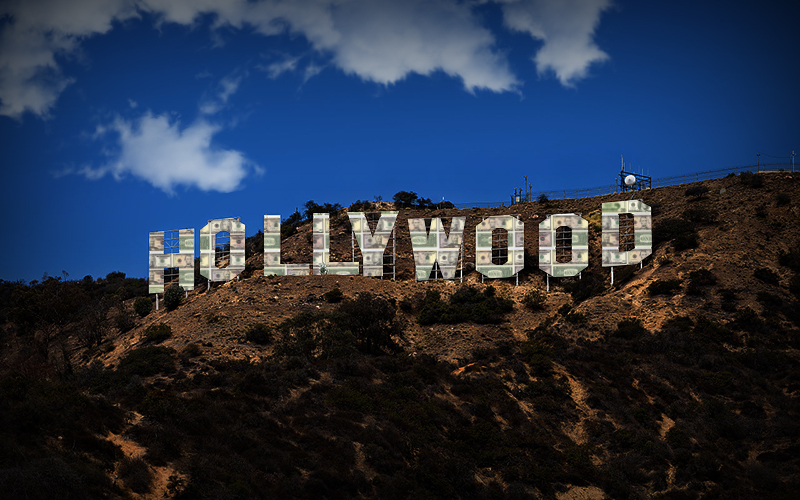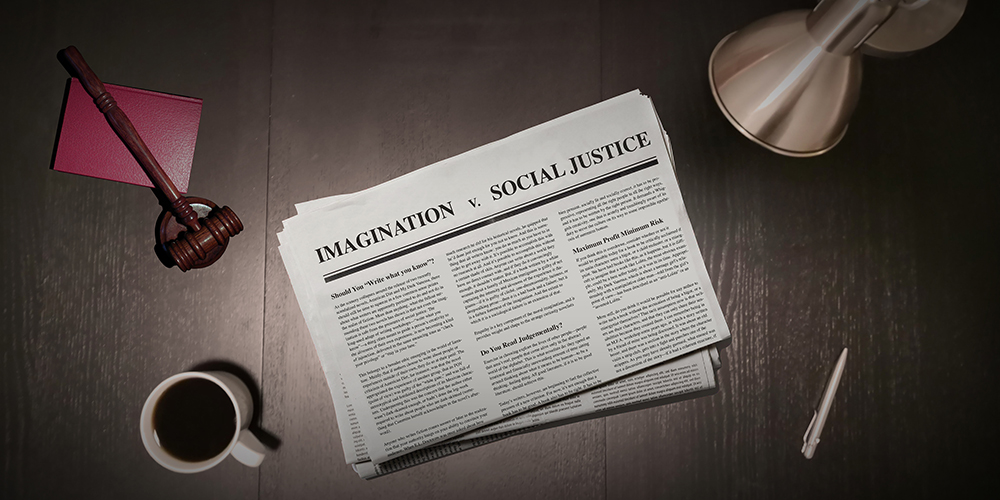As the scenery collapses around the release of two recently scandalized novels, American Dirt and My Dark Vanessa, there should still be time to squeeze in a few common sense points about what writers are apparently permitted to do and not do in the realm of fiction. More than anything, what the fallout surrounding these two novels has shown is that not even the imagination is safe from the pressures of social justice. The long-used adage of writing workshops — “write what you know” — a thing often meant to guide a person’s creativity to the aliveness of their own experience, is now becoming a kind of injunction, delivered in the same menacing tone as “check your privilege” or “stay in your lane.”
This belongs to a broader ethic emerging in the world of literature. Mainly, that if authors choose to write about people or experiences outside of their own, they do so at their peril. The criticism of American Dirt, for instance, was that the novel appropriated the experience of another group, that its POV (point of view) was guilty of the “white gaze,” and was full of stereotypical and fetishized descriptions of its Mexican characters. Underpinning this was the concern that the author either wasn’t dark-skinned enough or hadn’t done the leg-work required to write about people who are dark-skinned (something that Cummins herself acknowledges in the novel’s afterword).
Anyone who writes fiction comes sooner or later to the realization that your authority hangs on your ability to convince your audience. When E.L. Doctorow was once asked about how much research he did for his historical novels, he quipped that he’d done just enough for you not to know. And this is something that all writers know: you do as much as you have to in order to get away with it. It’s possible to accomplish this with no research at all. And it’s possible to accomplish this without a certain shade of skin. Anyone can write about a world they have no direct contact with, and if they do it convincingly enough, it shouldn’t matter. But, if a book written by a white woman about a family of Mexican immigrants is guilty of not capturing the intensity and aliveness of the experience it diagrams — if it is guilty of cliché, one-dimensionality, laziness, or sleepwalking prose — then it is a bad book and a failure, but it is a failure foremost of the imagination. And the extent to which it is a sociological failure is an extension of that.

Empathy is a key component of the moral imagination, and it provides weight and shape to the strange curiosity novelists exercise in choosing to explore the lives of other people — people that aren’t real, people that come alive only in the abstract world of the alphabet. This is what novelists do: they spend an irrational and financially unrewarding amount of time sitting around thinking about what it means to be human — to be a thinking, feeling thing. All good literature, if it is to be good literature, should achieve this.
Today’s writers, however, are beginning to feel the collective pressure of a new criterion. For now, it’s not enough that a book has to be good. A book also has to be right. It has to be bien-pensant, socially fit and socially correct, it has to be progressive, representing all the right people in all the right ways, and it has to be written by the right person. It demands a Whiggish creativity, one that is acutely and tremblingly aware of its duty to serve the culture on its way to some impossible apotheosis of summum bonum.
If you think this is overdrawn, consider whether or not it would be possible today for a book to be critically acclaimed if its main character were a bigot, or a child molester, or a misogynist. We have had books like this, as it happens, but it is difficult to imagine that a work like Lolita, the most obvious example, could be a best-seller today, as it was in its time. Appropriately, My Dark Vanessa, which is about a teenage girl’s relationship with a manipulative older man — told from the girl’s point of view — has been described as an “anti-Lolita” or an “inverted-Lolita.”
More still, do you think it would be possible for any author to write such a book without the accusation of being a bigot, or a misogynist themselves? That tacit assumption now is that writers are their characters and that they can only share their sensibilities because they created them. I can remember being in an M.F.A. workshop some years ago, in which a story written by a friend of mine was being discussed. It was about an old boxer, and there was a section in the story where the character visits a strip club, gets into a fight and punches one of the strippers. As you may have already guessed, what ensued was not a discussion of the story — if it had a coherent structure, the prose was alive, the dialogue was doing its job — but a protracted, two-hour, group-thinking debate about whether or not what the character had done was right.
This kind of thing happens in writing workshops more than you’d expect. It would be easy to dismiss as only the immaturity of young readers, but it describes the way a lot of people read books. They don’t read descriptively, they read judgementally. And those in M.F.A. programs are the very same people who become agents and editors and staff writers after they graduate, and they take this sensibility with them.
What this means is that works of art are often celebrated social reasons rather than artistic ones. When the remake of Ghostbusters was released in 2016, for example, most of the reviews hailed it as “a victory for feminism.” Joker, likewise, was lauded for its portrayal of mental illness and its indictment of the society that ignores it. And studio blockbusters like Black Panther, Captain Marvel, and Wonder Woman have also been praised for their inclusion and their diversity, even though they are global products that are designed not for the social good, but for maximum profit, and almost by definition require minimum creative risk.
As with the publishing industry and novels like My Dark Vanessa and American Dirt, these decisions are based on commercial imperatives. It is unlikely that Cummins’ novel would have received the advance it did or been promoted as heavily as it was, were it not for the fact that last year millions of Americans watched as hundreds of migrant families were encaged at the U.S.-Mexico border. The same could be said for the #MeToo movement and My Dark Vanessa. Author Wendy C. Ortiz, who claimed that My Dark Vanessa plagiarized experiences from her (Ortiz’s) own memoir Excavation, echoed this in a piece she wrote for Medium, in which she said that when she was pitching her book in 2012, editors told her that her story was “powerful” and “should absolutely be heard” — only to conclude that the memoir would be too difficult to sell because an audience for it couldn’t be found. Excavation was later published with a small press.
Hollywood and the publishing business are at once motivated by profit and the perceived need to respond to tectonic shifts in the culture and to promote work that informs the discussion about those shifts. This is not in itself a bad thing, but it is also impossible for it to be totally sincere since it mingles the demand for social justice with the ability to capitalize on it financially. If you want to pat a press or a studio on the back for “doing the right thing,” know that it was profitable for them to do so.

We have also seen how the Oscars, in attempt to shore up its ratings and shift its mountain of white guilt, has taken pains to celebrate films on the basis of diversity. This again, is well-intentioned and long overdue (especially for international films). But when Stephen King (who was a member of the committee) wrote that he would be choosing films based on artistic merit and not on diversity, he was righteously lashed by the Twitter mob for his insensitivity, including Roxane Gay, who said: “It implies that diversity and quality cannot be synonymous.”
This response is revealing, as it shows the demand for art to reflect society’s emphasis on inclusion, to the extent that diversity itself should be thought of as an aesthetic quality. King later tried to climb out of the ditch with an op-ed in The Washington Post, in which he said that the Oscars were still not nearly “good enough” when it comes to diversity, and this was made plain at this year’s ceremony, which was repeatedly trashed throughout by its attendees for the fact that more women were not nominated for Best Director. You fix one problem, and another one pops up.
Should more women have been nominated? Perhaps. Were the films made by those women good enough to be nominated? Do those women deserve to be nominated simply because they have been historically underrepresented, and that alone is justification? What if more women are nominated next year in response to the absence of women this year? Is that a genuine recognition of artistic accomplishment, or simply a correction made under pressure? And is pandering to the idea of diversity under pressure “good enough” to gratify those who demand it and will they see nothing disingenuous in it? I don’t ask these questions cynically, or rhetorically, but only because they point to whatever the ultimate goal might look like for those who want it the most if it is ever reached.
Since the Reformation, humanity’s relationship to art and especially literature has been a Liberal one. That is, the individual’s relationship to a text, and the way interpreting that text engages the individual conscience in its full imaginative autonomy. This is the essence of what Lionel Trilling described as “the Liberal imagination.” Trilling didn’t mean that writers were necessarily liberals, or that literature had to be liberal out of social or political responsibility. He meant that the imagination of what it means to be human — everything we are and everything we can be — was the spirit of Liberalism.
This is quite different from lowercase liberalism — the social and political liberalism whose job it is to identify problems and solve them, to make progress and get things right. I would argue that this is not, and has never been a feature of literature. Indeed, writers often tend to be culturally conservative creatures, even if they are stylistically modern. The romantics are the most obvious examples of this, and we regard them as radicals. We love some writers because they were social deviants — Baudelaire, Wilde, Burroughs. And we love some writers despite the fact that their work contains opinions or ideas that are repellant to us today, like Dostoyevsky’s or T.S. Eliot’s anti-Semitism.
If the works of these writers were judged by how they measured up to the moral standards even of their own time, they would have never made it out of their age. The question worth asking then seems to be not — “why continue to read books by a bunch of dead white guys who have outdated and offensive ideas?” But, “why do we still read them in spite of this?” The answer will take you somewhere beyond the constraints of progressivism, beyond the demand for art to “see its blind spots” or “check its privilege” or “hit the mark” or whatever it is people are demanding of their books and movies now.
It is impossible for art not to be political. Trilling described this as the “bloody intersection,” between the two worlds. It has always been nasty at that intersection and will continue to be. Diversity at the Oscars, accusations of appropriation and novels getting trashed for not being socially acute enough are all versions of that nastiness. These things don’t themselves have the power to determine the future of storytelling in a democratic society, only the way storytellers choose to respond to it. Will the storytellers cave under pressure, be on good behavior, stay in their lanes and only write books or make movies about things in their immediate experience, or will they let the imagination do the Liberal work it has always done, in allowing itself to explore the full range of human experience? If Reason is that prince of the faculties, then the imagination is its court jester. It can do things and say things that no one else can. It isn’t required to be nice, sparing, fair, or politically correct. Indeed, it is its job not to be. Let’s not be the court that cuts off its head. •




